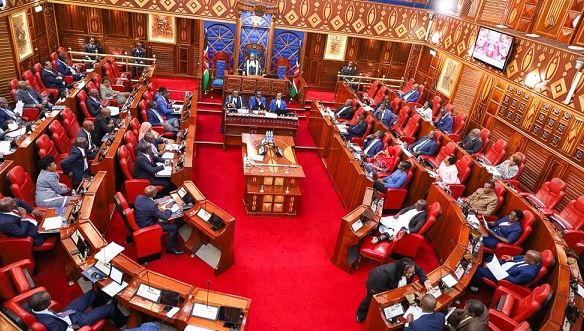
Heated exchanges dominated proceedings in Parliament this week as the Senate Committee on Energy engaged Cabinet Secretary for Energy and Petroleum, Opiyo Wandayi, over the contentious Energy Amendment Bill, 2025.
The Bill, which seeks to exempt county governments from seeking the Cabinet Secretary’s consent before levying charges on energy infrastructure such as wayleaves, drew sharp divisions among senators and government officials.
Wandayi defended the current legal framework, cautioning that devolving the levy to counties would complicate regulation and enforcement.
He further argued that Kenya Power may have adopted creative mechanisms to raise revenue, describing such innovation as normal for state corporations.
However, his remarks drew backlash from several senators. Senator Beatrice Ogolla (Nominated) criticised the CS’s position as “demeaning to devolution,” a view echoed by Senator Danson Mungatana (Kilifi).
On the other hand, Senator Dr. Boni Khalwale (Kakamega) supported Wandayi’s stance, warning that granting counties direct control over such levies could weaken accountability.
Nairobi Senator Edwin Sifuna pressed Wandayi to clarify the Ministry’s opposition to the Bill and explain the criteria for the current levy collected by Kenya Power.
The CS urged the committee to ensure that “all key sector stakeholders” are involved in further discussions, citing the matter’s sensitivity and far-reaching implications. The Committee is expected to continue its consultations before submitting a final report.
The Bill has also received strong backing from the Council of Governors (CoG), represented by Trans Nzoia Governor George Natembeya, who appeared before the committee separately.
Natembeya argued that the amendment would empower counties to benefit directly from levies collected within their jurisdictions.
“The Bill offers counties a fair opportunity to invest in energy infrastructure and local development. The levy should be utilized where it’s collected — at the grassroots,” Natembeya stated.
Despite his support, senators raised questions over counties’ capacity to manage such revenues transparently, citing existing concerns over accountability in county financial management.
Chairperson of the committee Dr. Oburu Odinga emphasized the need for a transparent and accountable framework should the Bill be passed.
Meanwhile, the Senate Committee on Education, chaired by Senator Betty Montet, held a consultative meeting with Nairobi Governor Johnson Sakaja to review the status of Early Childhood Development Education (ECDE) and Vocational Training Centres (VTCs) in the capital.
Sakaja, accompanied by CEC for Education Brian Mulama, briefed the committee on Nairobi’s education milestones, challenges, and ongoing reforms.
“I take the Senate extremely seriously and sincerely apologize for not appearing earlier when invited,” said Sakaja. “Education is very close to my heart — our children are the future of this country.”
Sakaja revealed that Nairobi currently operates 230 public and 839 private ECDE centres, with ongoing plans to expand access through the construction of additional classrooms. Of the public centres, 200 are integrated within primary schools, while 30 are stand-alone facilities.
The Governor further disclosed that the cost of constructing a standard ECDE centre ranges between Sh11 million and Sh18 million, covering classrooms, an administration block, and a kitchen.
The County allocates Sh100 million annually in capitation to support pre-primary education, maintaining a 100 per cent transition rate from ECDE to primary school.












